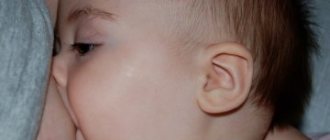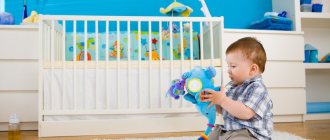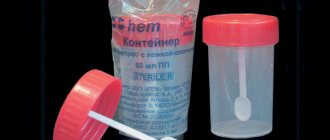Every caring mother monitors the well-being and health of the baby, paying attention to any alarming signs. The baby's stool is no exception, because while changing diapers, the woman constantly evaluates its structure, shade and smell. As long as bowel movements remain normal, there is no reason to worry or panic. But the appearance of loose stool in a breastfed baby can worry even experienced parents. It is necessary to respond promptly to pathological changes in feces, because developing dehydration is often dangerous for the baby. When is it too early to sound the alarm because of loose stools, and in what situations to take urgent measures, how to help a baby with diarrhea - you should figure it out today.
Normal stool for a breastfed newborn
A one-month-old baby who is breastfed may have slightly loose stools; there is no need to worry even if its color changes daily.
It can change depending on the food the mother ate the day before. So if a woman consumed dairy products before breastfeeding, then the diapers will be stained with bright yellow feces. Food of plant origin changes the color of stool to greenish - these are berries, green fruits and vegetables, dried fruits, spinach, parsley, dill. Even if your baby has green stool, you shouldn’t worry too much - a baby’s normal stool, regardless of the color, is mushy and not watery.
The color and consistency of the stool may vary; it may contain patches of mucus, lumps of undigested food, and the smell resembles sour milk. If a breastfed baby is cheerful and cheerful, eats with appetite, and does not wake up crying loudly, there are no alarm signals. The newborn's intestines are in the process of being colonized by beneficial microorganisms, which is why sometimes there are digestive problems and the thickness of the stool changes.
Artificially fed
Loose stools in bottle-fed infants are much less common. Typically, the structure of the stool in artificial babies is thicker, and the color of the stool is darker. This is due to the composition of the milk formula that the mother feeds the baby. If the food is prepared improperly, the stool can be very thick - therefore, constipation is more common for artificial dieters than diarrhea.
If an artificial patient has loose, orange-colored stools, this indicates problems with the liver. When hidden or obvious blood appears in the stool, the stool becomes dark, almost black.
Loose stools are rare in bottle-fed babies.
Mixed feeding
Liquid stool appears in a mixed-fed baby due to an unbalanced diet, the mother's consumption of foods or medications that are prohibited during lactation. Normally, with mixed feeding, the stool is brown in color, the consistency is thick, and the frequency of stools is within 1-2 times a day.
If the mixture is prepared too thick, the baby poops with an admixture of cheesy particles - this symptom is not dangerous and goes away on its own within a few days. If loose stools appear, it is not recommended to give up breastfeeding in favor of formula. After all, mother's milk contains a set of vitamins and substances necessary for the full development of the baby.
The frequency of bowel movements of a newborn is normal
In the first month of life, a breastfed baby can walk up to ten times a day, and this is not considered a pathology. Once the baby reaches one month of age, this frequency gradually changes, and bowel movements occur 3-5 times a day. Children older than six months begin to poop 1-2 times a day or even less often, it all depends on their general well-being, the nature of their diet and the nuances of introducing complementary foods.
On a note! Frequent bowel movements of a newborn often frighten new parents, but in this way the breastfed baby’s body tries to adapt to new living conditions and the way of getting food. Therefore, if the baby is feeling normal, has good weight gain, and has a mushy stool consistency, the baby’s parents have nothing to worry about.
Fecal norms for different feedings
The color and density of bowel movements in infants are determined by the method of feeding.
- When breastfeeding, stool is released that is liquid and mushy, resembling diarrhea in appearance. The color of the mass is yellow, green, and golden. The diet of a nursing woman is responsible for the coloring of food waste. The dairy products she consumed make her stools yellowish. If plant ingredients predominate in the diet, the newborn may experience greenish stools. Curdled lumps among stool are also considered normal. The stool smells sour.
- In formula-fed babies, the shades of stool vary from pale yellow to light brown. The consistency is thick and pasty, the smell is unpleasant. The stool of a child under one year of age becomes thick and more or less formed after the introduction of complementary foods.
Regarding the frequency of stool, Dr. Komarovsky says that in the first month of life, a baby can have bowel movements up to 10 times. per day (almost after every feeding). “Artificial babies” poop half as often and in larger portions. Delayed stool for up to 2 days without manifestations of flatulence is not considered a deviation.
How to distinguish diarrhea from loose stools?
Loose stools that appear in a newborn during breastfeeding often do not indicate a pathological condition of the child. To know when to seek medical help, you need to learn the signs of diarrhea:
- the frequency of trips increases significantly;
- normal mushy stools liquefy, acquiring a watery structure;
- the passage of feces from the intestines becomes abrupt and unexpected;
- the stool has an intense sour smell, which is uncharacteristic of a baby’s usual trip to the toilet;
- the color of stool changes to greenish or dark green;
- Watery stool in a breastfed baby may contain an admixture of foam, blood and mucous clots.
At the same time, the child’s well-being suffers - he refuses to feed, cries, the temperature may rise, the stomach is hard, swollen and painful. If the stool is simply liquefied, without signs of diarrhea, the listed symptoms will be absent, and the baby will feel healthy.
Causes of diarrhea in newborns
Loose stool in a newborn with mixed feeding and when attached only to the breast can occur for a number of reasons. Doctors include the main ones:
- intestinal infections are often common causes of loose stools in breastfed and mixed-fed infants. The intestinal tract is affected due to the failure of the protective system and the incomplete formation of beneficial flora;
- lactose intolerance - in this case, the child’s stool has a foamy structure and a distinct sour smell. This happens due to a lack of enzymes in the intestines necessary to digest milk sugar;
- Intestinal dysbiosis is an imbalance between beneficial and pathogenic flora, which more often occurs when the mother takes antibacterial drugs. The symptoms of dysbiosis are similar to an intestinal disorder;
- errors in the diet of a nursing mother - early introduction by a woman of peas, white cabbage and exotic products into her menu;
- growth of baby teeth - during this period, the baby experiences an increase in temperature, upset stool, and saliva flows profusely from the baby’s mouth.
Non-infectious diarrhea can be caused by the baby receiving more foremilk than hindmilk. It is more liquid and contains the maximum amount of water, while the back one is necessary for the baby to saturate the body with fats and proteins. The hind portion of milk contains useful vitamins for the formation of healthy intestinal flora, and its deficiency has a detrimental effect on the baby’s stool.
Improper nutrition of the mother during breastfeeding can cause loose stools in the baby
Treatment of intestinal disorders
To prevent possible chronic diseases of the digestive system, treatment of the gastrointestinal tract in infants should be started in a timely manner. In case of diarrhea, the child’s body should be replenished with the missing fluids and salts. To treat diarrhea, the doctor may order several bacterial tests and, relying on their results, prescribe medications.
Under no circumstances should you listen to the advice of experienced mother friends or solve the problem yourself, because this can lead to a worsening of the baby’s condition.
As you know, prevention is the best way to protect. A nursing mother should strictly observe baby hygiene. An adult cannot “sterilize” a child’s nipple with his saliva, because this promotes the transfer of microflora from his mouth to the child’s mouth and gastrointestinal tract. The baby should be fed every 2.5-4 hours (including at night). The baby should be placed on one breast for two or even three feedings in a row so that he sucks not only the front milk, but also the hind (fat) milk. If your breasts are full, you should express some foremilk.
By following these recommendations, you can avoid the development of intestinal disorders in infants.
Symptoms of the disease
First of all, the development of the problem is indicated by yellow, loose stools in a breastfed baby. The baby soils the diapers several times more often than usual, the color of the stool changes to greenish, and the consistency changes to watery. The feces also acquire a pungent odor with notes of rot.
Pathological stool causes bloating, the newborn becomes anxious and screams. At night he often wakes up, and intense rumbling can be heard in his tummy. Liquid stool streaked with blood in a baby should frighten parents, as well as the appearance of a large amount of foam in the stool. Against the background of colic and pain in the gastrointestinal tract, the temperature often rises, which is also an alarming symptom.
Attention! Such a picture should not leave parents indifferent; the baby’s body is prone to rapid dehydration. In order not to provoke dangerous complications, you need to monitor the baby’s well-being and take measures to eliminate loose, mucous stools.
Stool in newborns
First of all, a newborn’s stool depends on whether the baby is breastfed, either breastfed or mixed. Feces should be yellow in color and have a uniform consistency in the form of a thin porridge-like mass. Sometimes there may be white lumps in the stool. Breastfed babies under 2 months of age may have loose stools up to 7 times a day. It will not require treatment unless the child has the following signs:
- vomit;
- bloating;
- anxiety;
- baby cries during feeding;
- temperature above 37.3°C;
- weight loss;
- green stool;
- the presence of streaks of blood in the stool.
If more than one of these symptoms are present, you should contact your doctor immediately.
What should parents do if their baby has diarrhea?
If a bottle-fed baby has problems with stool, then the milk formula should be changed.
Diarrhea during artificial feeding is less common than loose stools in a breastfed newborn. But parents of infants need to know what to do if their baby starts having diarrhea:
- Observe the baby’s condition, his appetite, sleep and mood.
- Adjust the diet of a woman breastfeeding. Diarrhea is often provoked by eating fatty, fried, smoked and over-salted foods. In addition to thinning baby's stool, these foods help reduce milk supply.
- Do not give up natural feeding. Against the background of various diseases, mother's milk protects the child's body and saturates it with substances that increase the resistance of the immune system. This will make it easier for the baby to overcome harmful bacteria in the intestines, and he will not develop dehydration.
- Only bottle-fed babies and mixed-fed babies need to be supplemented with water. Breasts get enough fluid contained in breast milk.
- Change the milk formula if the baby receives it alone or together with breast milk. Perhaps an unexpected reaction has developed to the components of the new diet. But changing formulas is often not recommended due to the long adaptation of the child’s body and possible digestive problems.
By observing the baby for 1-2 days, you can find out whether the condition is pathological, requiring medical intervention, or whether digestive problems simply arise due to a combination of a number of negative factors. If parents are worried about their baby, a visit to the doctor would be a good idea.
In what cases is it necessary to see a doctor urgently?
If, when a breastfed baby develops liquefied stool and parents monitor its condition, alarming symptoms develop, do not hesitate to call a doctor. These dangerous calls from doctors include:
- the child constantly cries and writhes his legs;
- there are problems with sleep;
- the baby refuses to be fed, becomes lethargic and capricious;
- urination becomes rare or absent, and the urine smells sharp and pungent;
- the baby noticeably lost weight in a few days;
- the temperature rose sharply;
- the abdomen is hard and swollen, and upon palpation the baby cries loudly.
If lumps of mucus are noticeable in the stool against the background of greenery and an unpleasant odor, the problem may be caused by dysbacteriosis. If your stool is constantly liquefied and has a yellow tint that does not recover for a long time, lactase deficiency can be suspected. In this situation, diarrhea is caused by a lack of enzymes that break down lactose.
Poor sleep and high temperature are reasons to consult a doctor
How to restore a chair?
To normalize the color and thickness of stool in a breastfed newborn, doctors recommend using a special technique and principles of feeding. So, when feeding, you need to ensure that the baby grasps the areola completely or most of it, but not the nipple itself. If a woman does not have enough milk, she needs to establish feeding and increase lactation - she should feed the baby on demand, and not after 3-4 hours. Expressed milk should be kept in the refrigerator to prevent it from turning sour and causing diarrhea.
Advice! During feeding, you should try to give your baby the back portion of milk, it is thicker and rich in nutrients. Feeding only foremilk will make the stool loose and watery, and the baby will lag behind in weight. You should not take the breast from the baby before he releases it, even if the feeding process lasts 20-30 minutes.
How to adjust a mother’s diet if her baby has diarrhea?
The mother's diet during breastfeeding directly affects the well-being of the baby. When a woman violates the rules of nutrition during lactation and eats spicy, fatty, salty foods, the baby may react to errors in the diet with diarrhea. A nursing mother should be especially careful about her diet during the period of restoration of normal stool in the child. To do this, you should exclude a set of products from the menu:
- products containing food additives, preservatives, dyes and flavors - these are ready-made sauces (ketchup, mayonnaise), canned food, instant noodles;
- exotic fruits and vegetables;
- carbohydrate foods, baked goods, cakes, pastries, chocolate, white bread;
- alcoholic drinks;
- cabbage and legumes;
- onion garlic;
- soda, coffee, black tea and cocoa.
To restore the functioning of the baby’s gastrointestinal tract, you can prepare herbal decoctions - an infusion of linden blossom or mint, a decoction of green aspen buds, rice, aspen grass, and rose hips. These products should be given to the baby with the permission of the pediatrician, a few teaspoons at a time. Rice water has been popular since ancient times; it is diluted with water in a ratio of 1:3 and given to the baby in several doses.











